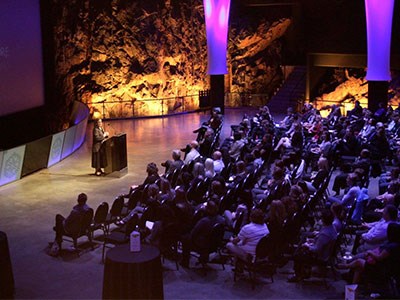When seeking out women role models, you can’t do much better than Ilse Treurnicht, the CEO of the MaRS Discovery District in Toronto.
Treurnicht excelled in school and athletics, becoming South Africa’s national middle-distance running champion. But her privilege as a white woman living in the era of apartheid posed ethical challenges for the conscientious student. A Rhodes Scholarship to attend Oxford University in 1979 allowed her to leave the country, and she became one of the first women admitted to Oxford’s prestigious Balliol College.
She believes hers is a story like any other, but at the same time recognizes the value in sharing her history with successive generations of women struggling to find balance in the world of business.
“I said yes (to speaking) because I know telling stories is very important, and too many women’s stories actually remain untold,” Treurnicht said during an October talk presented by NORCAT in Sudbury. “These stories — even unentertaining ones like mine — can sometimes be useful as guideposts and navigation tools, particularly for younger women.”
In many cases, archaic attitudes and restrictive workplace policies that are “misaligned with the reality of women’s lives” continue to throw up barriers to women’s success, she said.
After graduation, Treurnicht was hired at a startup company while two months pregnant, and she received a promotion just before her due date, making it impossible to take time off. She ended up bringing her newborn to work for several months, something she now calls “just really stupid.”
Women still face pressure to meet certain milestones during the 10-year period around when women are focused on raising children, Treurnicht said. But today she’s seeing women emerging with success in their 50s, 60s and 70s, starting new careers and doing great things.
She enjoyed her move into consulting, where she worked with startups to help raise capital. Her deftness caught the attention of a bank which asked her to start a venture capital fund. It was rewarding work, but she remained an outsider.
“I’ve never worked in an environment that was as hostile to women as the venture capitalists; it’s like nothing I have ever seen,” she said. “That has huge implications for women founders that are trying to build businesses, and I’m sad to say it hasn’t changed one bit.”
After joining MaRS, Treurnicht realized, for her, it’s important to work with great people on projects that aren’t just intellectually challenging, but also have purpose. That approach will attract talented people and create an energy and workplace that’s difficult to replicate, she said.
Time is valuable, and life is a marathon, not a sprint, she advised, urging women to save their energy for important items and avoid toxic workplaces. Having children helped with this, because they teach parents not to sweat the small stuff, Treurnicht said.
“I don’t know any CEOs who work 30 hours a week and every compromise has a price tag,” she said.
But she urges women to make those compromises by choice and not by default. They have to be the ones to decide what’s important.
“I really think the biggest danger is to be a spectator of your own life,” Treurnicht said. “Choices are what make it meaningful, independent of our circumstances.”
By turns, different areas of her life have taken priority, but Treurnicht said it’s important to her to have her professional and societal values in sync, and tension arose during the periods when they were in discord.
Life is like a book full of chapters that each needs to be written by you, she advised.
“It’s not somebody else’s life and it’s not a dress rehearsal, or something that might happen in the future, so you’d better get on it,” she said. “Figuring out what’s important to you, what your values are and what you’re good at and not so good at is really important, because once you’re over 18, nobody’s going to care more about how your book’s written than you.”
Treurnicht argues that, as Canada looks to contribute innovative solutions to the world’s biggest problems — climate change, global health, future of capitalism, aging society — it’s to the country’s benefit to include women at the table.
“So now, from my perspective, the obligation is on us as women to figure out how we can really shape the conversations, how we can bring new collaboration skills, how we can bring new capabilities, new approaches to consensus-building to those tables,” Treurnicht said. “How can we bring our best game and make a real difference?”



